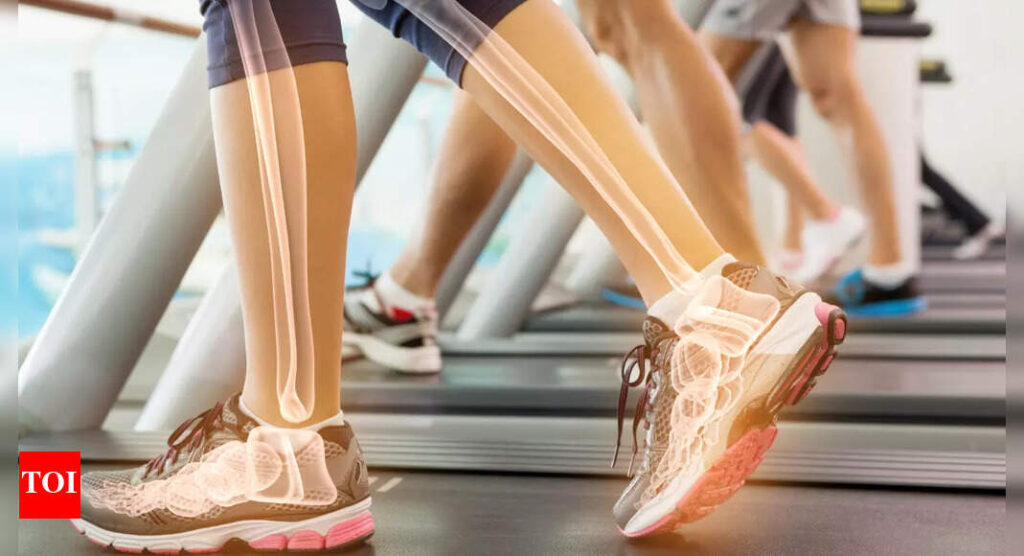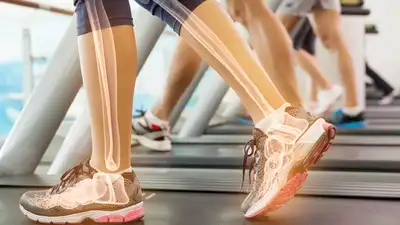5 ways to boost bone health and future-proof them against osteoporosis |

Fitness and wellness are in the spotlight like never before. While much focus is on building muscles and losing weight, bone health has taken a backseat. But neglecting bone health could drastically affect the quality of life, especially as one ages. With age, the risk of conditions like osteoporosis also increases, which could lead to fractures, loss of mobility, and a decline in quality of life. But the good news is, you are never too late to start caring about your bone health. By making certain lifestyle changes, you can strengthen your bones and protect them for the long haul. People in their 20s, especially, can start focusing on their bone health. Here are 5 effective ways to boost bone health and reduce the risk of osteoporosis. Calcium and vitamin D are vital

Calcium and vitamin D are vital nutrients for bone health. Calcium is the building block for bone health. This nutrient helps in maintaining bone density. Vitamin D, on the other hand, helps in the absorption of calcium. A deficiency can lead to decreased bone density and increase the risk of fractures and conditions like osteoporosis. Dairy products like milk and yogurt, leafy greens, and fortified foods are excellent sources of calcium. Vitamin D, the ‘sunshine vitamin,’ can be obtained from fatty fish, egg yolks, or supplements. The body can naturally produce vitamin D, when exposed to sunlight.Add some protein

Yes, that’s right. Protein is not only essential for your muscles, but also for your bones. The collagen and amino acids provided by the protein can help to make up about half of the bone’s volume. You can add lean meats, fish, eggs, beans, and tofu to your diet to improve protein intake. Studies also suggest that when you pair protein with calcium-rich foods, the benefits multiply. However, be aware of your protein intake. Excessive intake can strain the kidneys in some individuals.Quit smoking and drinking

The best thing you can do for your bones is to quit smoking and drinking alcohol. Yes, that’s right. These indulgences can sabotage your bone health. This is because smoking reduces blood flow to bones and impairs their ability to repair and rebuild. A 2022 study found that smoking is linked to a 40% higher fracture risk. Alcohol, on the other hand, is linked to chronic health issues. Alcohol intake interferes with calcium absorption and bone formation. Quitting smoking and alcohol can significantly reduce these risks.Targeted exercises
Exercise is a powerful tool for bone health. However, instead of doing random exercises, ensure to incorporate the ones that target boosting the strength of bones. Weight-bearing exercises like walking, jogging, or dancing may stimulate bone formation. Similarly, resistance training, such as lifting weights or using resistance bands, will strengthen bones by applying stress that triggers growth. Balance and agility exercises, like tai chi or yoga, can help reduce fall risk, which is critical as falls cause most osteoporosis-related fractures. Aim for 30 minutes of weight-bearing, resistance exercise, or agility work twice or three times a week.
Early-onset screening Early screening can catch osteoporosis before fractures occur. If you have risk factors such as a family history, early menopause, or long-term steroid use, it is important to talk to your doctor about a bone density test. Women over 65 and men over 70 should screen routinely, but younger adults with risks may need earlier testing. Early detection can improve treatment outcomes, and lifestyle changes can halt bone loss.NB: This information is based on internet research and is intended for general knowledge only. It should not be considered a substitute for professional medical advice.







